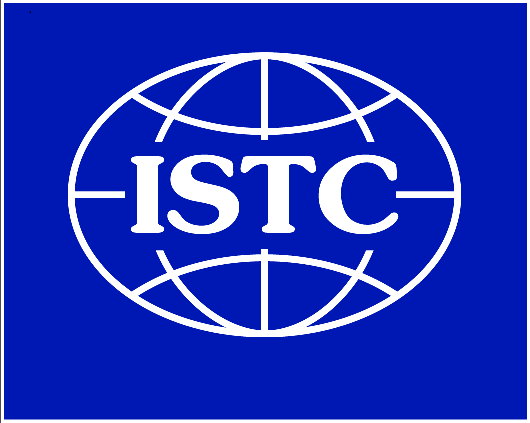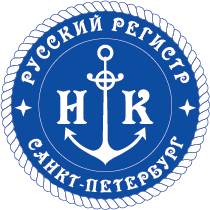NEWS AND COMMENTS
Declaring the transport of dangerous goods - an additional security guarantee...
Pre-shipment inspection of tank containers intended for the carriage of dangerous goods...
ISTC started training experts...
Preparation for the XIV International Conference "Multimodal Transport of Dangerous Goods"...
Training of specialists in a new quality...
"Sea Trade Port "Ust-Luga" JSC has successfully passed the certification audit...
IDGCA presents Russian version of the IMDG Code latest edition on disks...
An IMO circular does not define competency of national authorities...
XIII International Conference «Multi-modal transportation of dangerous goods»...
An IMO circular does not define responsibilities and authority of national organizations...
| Merry Christmas and Happy New Year! | |
|---|---|
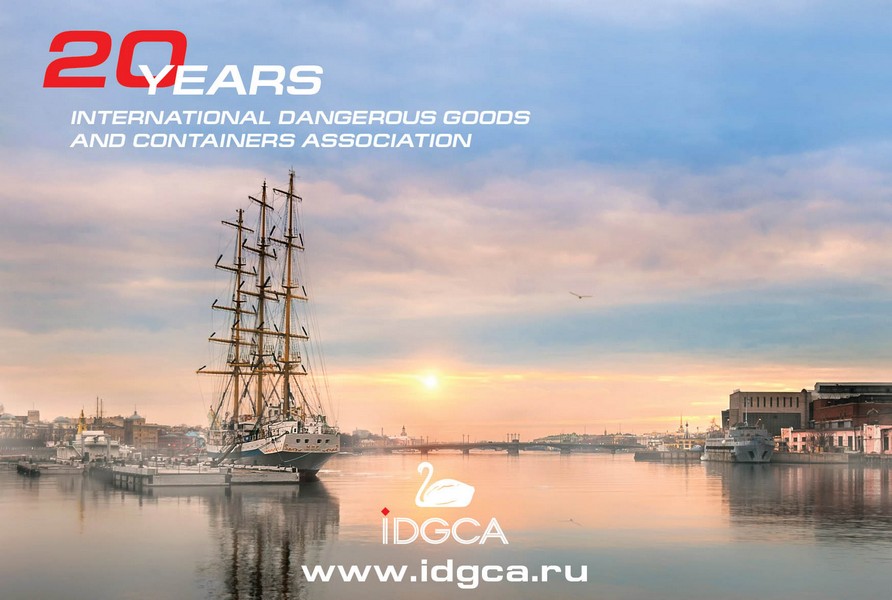 | |
Russia introduces a temporary procedure for licensing the handling of dangerous goods | 22.12.2020 |
|
In accordance with the Federal Law “On Licensing Certain Types of Activities”, the Resolution of the Government of the Russian Federation dated December 4, 2020 ¹ 2027 approved the Regulation on Licensing Loading and Unloading Activities for Dangerous Goods in Inland Waterway Transport, in Seaports. At the same time, we would like to draw your attention to the fact that the phrase “loading onto ship” in clause 3 of this Regulation contains two mistakes in the word “loading” (in Russian: “ïàóçêè” instead of “ïîãðóçêè”). The same Resolution approved the Regulation on Licensing Activities for Transportation by Inland Water Transport and Sea Transport of Passengers. The Resolution comes into force on January 1, 2021 and is valid until July 1, 2021. | |
Meeting of the UN Working Group on Tanks | 21.12.2020 |
|
On December 16, 17 and 18, 2020, a remote meeting of UN experts participating in the preparation of proposals for amending the Model Regulations of the UN Recommendations on the Transport of Dangerous Goods, as well as the ADR and RID Regulations regarding the requirements for tanks intended for transportation of dangerous goods, including the rules for the approval of types of tanks, was held. The audience of experts consisted of more than 25 people, including representatives of such leading European countries as The United Kingdom, Germany, Poland, and international organizations such as BAM, ITCO, VTG and others. The General Director of IDGCA, Ognev M.I., took part in the meeting as an expert. Following the meeting, a document will be prepared for submission to the UN ECOSOC Subcommittee of Experts on the Transport of Dangerous Goods and the Joint Meeting of UNECE Experts and the Working Group on the Transport of Dangerous Goods. The informal working group is chaired by Mr. Steve Gillingham from the United Kingdom Department of Transport. | |
New labor protection rules | 11.12.2020 |
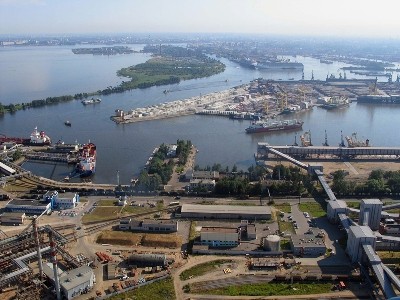
The Ministry of Labor and Social Protection of the Russian Federation has established new rules on labor protection during the operation of industrial transport (Order of the Ministry of Labor and Social Protection of the Russian Federation 814í) dated November 18, 2020 "On approval of the Rules on labor protection during the operation of industrial transport", registered with the Ministry of Justice of the Russian Federation on December 9, 2020, registration number 61355). The new version of the rules takes into account the current level of development of technical equipment and technology in this area. The order comes into force on January 1, 2021 and is valid until December 31, 2025. This document, which concerns many fields and enterprises of the industry and transport, has yet to be studied, but now the question arises of how the new rules will relate to the Labor Protection Rules in Sea and River Ports, approved by order of the Ministry of Labor of Russia dated January 21, 2019 ¹30í registered with the Ministry of Justice of the Russian Federation on April 1, 2019, registration number 54222. The new rules also cover the requirements for vehicles used for the transport of dangerous goods. | |
Training of state inspectors in the field of transportation of dangerous goods | 10.12.2020 |
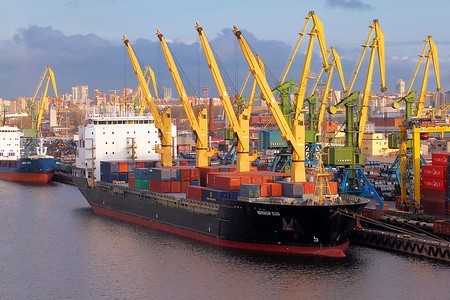
At the end of November, 49 officials responsible for ensuring the safety of the transport of dangerous goods and performing supervisory and control functions at sea and river ports passed online training at the International Staff Training Center (ISTC). This training was preceded by serious work on the development of a training program that takes into account the specifics of the official duties of state inspectors. A relatively short 40-hour program included only those issues the knowledge of which is essential for employees of any supervisory and control body carrying out its activities in sea and river ports. The program took into account the practical experience of inspectors and surveyors of “Russian Register” CJSC accumulated by this company in carrying out of inspection activities as an independent organization. During the training, special presentations and video materials were used. Today ISTC is the only educational organization in Russia that trains such specialists. In total, the center has trained more than 100 state inspectors, including customs inspectors. | |
Next ISO President | 01.12.2020 |

The International Organization for Standardization (ISO) today announced that Ulrika Francke from Sweden has been elected as the next ISO President, following voting by the ISO member bodies. She will take up the position in January 2022 at the completion of the term of current President Eddy Njoroge from Kenya, and serve as President-elect throughout 2021. Ms. Francke has extensive experience in standardization, currently serving as Vice-President of ISO member SIS, the Swedish Institute for Standards. Prior to her role at SIS, she was Chair of the BIM Alliance, whose purpose is to develop standards for the real estate and building sector. Ms. Francke’s career has spanned both public and private sectors. The International Dangerous Goods and Containers Association, member of the ISO/TS 220 Subcommittee for Cryogenic Vessels, congratulates Ms. Franke on her appointment to her new position and wishes her every success in her work. | |
The quality of staff training is confirmed by an international certification society | 01.12.2020 |
|
On November 30, the leading international certification body DNV GL conducted a scheduled audit of the quality management system applied in the International Staff Training Center of the International Dangerous Goods and Containers Association (hereinafter ISTC) in accordance with the requirements of the International Standard ISO 9001-2015. The audit was performed as part of the certification process to maintain the management system certificate of conformity ? 251622-2017-AQ-MCW-FINAS. The main purpose of the audit was to determine the compliance of the management system with the Standard. In addition, the effectiveness of the management system was assessed as a guarantee of the ISTC's ability to achieve its goals and comply with applicable legal requirements. The focus area "The effectiveness of training and organization of the training process" was highly appreciated as a whole. The auditor noted the following positive results:
It was especially noted that the organization was relocated to a new office without compromising the level of staff training. | |
Container ship capsized in Surabaya | 26.11.2020 |
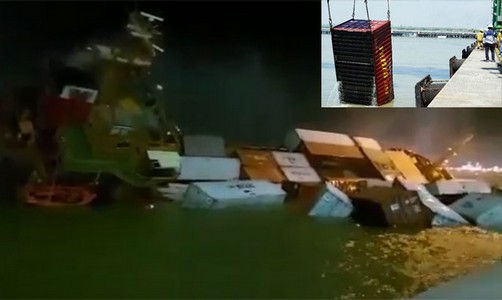
According to FleetMon web-site, container ship “MENTARI CRYSTAL” capsized with its starboard resting on bottom along pier at Teluk Lamong Terminal, Surabaya, East Java, Indonesia, on November 15, 2020. There were 137 containers on board at the time of the accident. The crew was not injured. According to the preliminary version, the incident occurred due faulty ballasting and containers stowage. We assume that the control over compliance with the established procedure for loading and securing cargo in accordance with the Intact Stability Code (ISC Code 2008), (approved by Resolution MSC.267 (85), (as amended on June 05, 2015) has been violated. In accordance with this code, loading and unloading of cargo must be carried out with a heel and trim of no more than 3 degrees, and bunkering and ballasting of the vessel must be completed before loading containers on the deck. | |
Transportation of dangerous goods by sea requires careful preparation | 18.11.2020 |
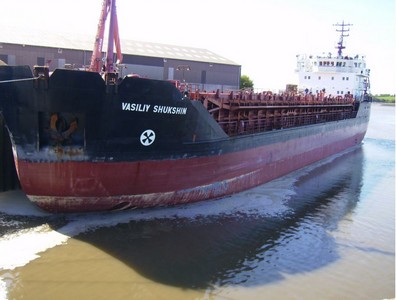
According to the Federal Marine and River Transport Agency of the Russian Federation, the “Vasily Shukshin” dry cargo ship, traveling from the port of Pusan (South Korea) to Vostochny port, lost speed 35 miles off Vostochny port and was towed to the roadstead by “Spasatel Zaborshchikov” rescue vessel. Cargo of the 7th hazard class was transported on board "Vasily Shukshin" in containers. The total weight of the dangerous cargo was 172 tons. The reason for speed loss of the vessel was declared the lack of fuel on board, which is rather strange, since the distance from the port of Busan to Vostochny port is 915 kilometers. The only reason, as experts suggest, could be the desire of the ship owner to save money on fuel and to fill up in Russia, where fuel is cheaper, instead of fuelling in South Korea. It seems that the ship owner decided to save money at the expense of safety. “Vasily Shukshin” vessel flies under the Belize flag, Bureau Veritas class, and the crew is Russian. The vessel was built in 1995. It can be assumed that the vessel has all valid documents confirming its compliance with international conventions and codes, including ISM Code and SMS. However, judging by the emergency that happened, the readiness of the vessel for the upcoming voyage, as well as the training of the crew, were not sufficient. Also, such factors as the navigation area and special conditions for the carriage of dangerous goods of hazard class 7 were not taken into account. It is scary to imagine what could have happened if the ship lost its speed in a severe storm. This emergency situation, like other similar cases observed in modern maritime practice, suggests that the presence of documents issued by the classification societies and confirming the compliance of the vessel and the crew with the requirements of conventions, codes and regulations does not guarantee the satisfactory condition of the vessel and proper training of the crew. At the same time, the payment for the services of classification societies, including the costs for various management systems are so high, that sometimes there is not enough money to ensure real safety. It is no coincidence that insurance companies engage independent surveyor organizations for inspecting ships before insurance. | |
The problem of safety ensuring on inland waterways of the Central European part of Russia | 13.11.2020 |
|
On the 11th of November, 2020 a round table under the leadership of the Deputy of the State Duma of the Russian Federation, the President of National Association for Digital Economics, Konstantin Slyshchenko was held on the problem of safety insuring and infrastructure improvement on inland waterways of the Central European part of Russia. On the part of "IDGCA" NP, General Director of "IDGCA" NP, Mikhail Ognev and Deputy Director of "Russian Register" JSC, Viktor Kuzminkov, Sea Capitan, took part in the work. | |
Distance learning on dangerous goods | 13.11.2020 |
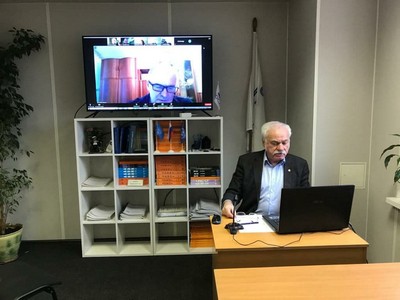 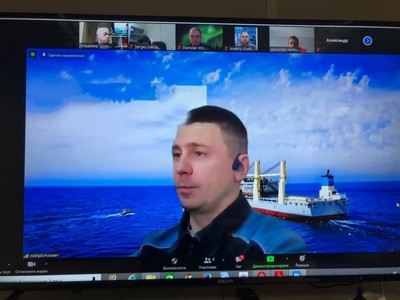
The International Staff Training Center (ISTC) has started regular distance learning for students in various programs of continuing professional education. For many companies and organizations whose employees work "remotely", distance learning not only saves money on business trips, but also allows for on-the-job training. A distinctive feature of ISTCis not only its affiliation with “IDGCA” NP, which has a consultative status in the UN ECOSOC Committee of Experts on the Transport of Dangerous Goods and the Globally Harmonized System of Classification and Labeling of Chemicals, but also the constant novelty of information and an individual approach to each enterprise and to every retrainee. The heads of enterprises send their employees to ISTC for training with the aim of not only obtaining certificates of advanced training, for example, for a certain licensed type of activity, but first of all to improve the knowledge level of employees, which helps business development. Today, final exams have been successfully held in a study group of students of one of the leading international forwarding companies. | |
Uninvited dangerous guest | 16.10.2020 |
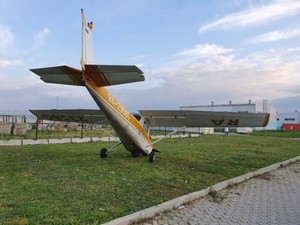
According ?????????? to the information of the North-West Investigations Directorate for Transport of the Investigative Committee of the Russian Federation, an audit is being carried out on the fact of an emergency landing of a light-engine private aircraft on the territory of Port Bronka. The uninvited guest landed near a special storage and handling area designed for dangerous goods. By a happy coincidence, there were no casualties or destruction, and the hapless passenger, according to eyewitnesses, was evacuated by helicopter, safe and sound. The reason for the emergency landing of the aircraft in the closed area of Port Bronka will be investigated, but this incident once again raises questions about how flights over hazardous areas where hazardous substances are stored or may be stored are regulated and whether they are generally regulated. When an aircraft hits them, such substances can detonate, create conditions for the emergence and spread of toxic and explosive clouds, which can lead to tremendous destruction on the territory and take away human lives. Again, we would like to remind the fact we wrote about earlier that there is no law on the transportation and storage of dangerous goods, which could regulate, among other things, issues related to the prohibition of flights, primarily of private aircraft, near places of storage and handling of dangerous goods. Photo was taken from the official website of the North-West Investigations Directorate for Transport of the Investigative Committee of the Russian Federation. | |
Staff training during a pandemic | 06.10.2020 |

During the coronavirus pandemic, the International Staff Training Center (ISTC)moved to a new location at the address: 198095, St. Petersburg, st. Marshal Govorova, 35A, Business Center “Zhyoltiy Ugol” ("Yellow Corner"), office 436, tel. +7 (812) 740-20-19. At the same time, not only licensing requirements for office premises were taken into account, but also the specifics of working conditions in a pandemic, in particular, the need to comply with special sanitary standards when conducting resident training. Despite this, distance learning has a priority, because many organizations and enterprises are afraid to send their employees on business trips, and in some enterprises business trips are generally prohibited. The use of distance learning not only did not reduce the requirements for exams at ISTC and for certification in the International Dangerous Goods and Containers Association (IDGCA NP), but rather, on the contrary, increased the requirements for the level of professionalism of students and candidates for obtaining the titles of experts, inspectors and dangerous goods transport advisors. The conditions of the pandemic did not affect the level of requirements for compliance with safety standards and did not abolish the rules for licensing the relevant activities related, in particular, to dangerous goods. Students who have passed certification in "IDGCA" NP receive certificates of the Association and are entered into its Register. ISTC conducts training not only in the field of dangerous goods, but also in other areas of additional education, mainly related to security. | |
Happy Birthday! | 11.09.2020 |
|
The International Dangerous Goods and Containers Association wish a Happy Birthday to its President, Vice Admiral, Gennady Yuryevich Moshkov. Dear Gennady Yuryevich, we wish you good health, even more creative energy and good luck in its implementation, excellent mood and thank you for your active and fruitful work as the head of our organization! | |
Russia needs a law on the transport of dangerous goods | 03.09.2020 |

Lack of a single legislative or regulatory act governing the transportation and handling of dangerous goods, including high consequence dangerous goods, according to experts of IDGCA NP, negatively affects the economy and safety of transportation of dangerous goods by various modes of transport, including a multimodal message. Separation of departmental requirements, uncontrolled issuance of regulatory documents by individual departments, lobbying for the interests of controlled commercial structures – all this has been present on the market for services for the transportation of dangerous goods for many years. Representatives of Russian business have repeatedly encountered this, but, unfortunately, no one notices their difficulties, and they are simply not paid attention to. Understanding these problems, IDGCA NP sent an appeal to the Chairman of the Government of the Russian Federation with a proposal to develop a draft law on the transportation of dangerous goods. Experts of IDGCA NP, having not only theoretical knowledge, but also practical experience, in practice themselves faced the fact that the lack of legislative and regulatory legal regulation negatively affects their own work. At present, experts are working on the concept of the proposed law and, if this proposal is accepted by the Government of the Russian Federation, the specialists of IDGCA NP, including the members of the Association, will take an active part in the development of the bill. Support of the activities related to the handling of dangerous goods. The secretariat of IDGCA NP will highly appreciate any constructive proposals for organizing this work. In October 2020, “IDGCA NP plans to hold a seminar on multimodal transport of dangerous goods, where this initiative will be widely discussed. The form of the seminar will depend on the sanitary and epidemiological situation in Russia. | |
Letter to M.V. Mishustin | 03.09.2020 |
|
Dear Mikhail Vladimirovich! At present, a broad discussion of the draft Federal Law “On Amendments to Article 1 of the Federal Law “On Transport Safety” and the Invalidation of Certain Provisions of Legislative Acts of the Russian Federation” (hereinafter – the draft law) is underway. Despite the fact that the term of public discussion of the document has expired, this draft law continues to be the subject of heated discussion; the developers of the document continue to receive critical remarks from representatives of leading non-governmental organizations in Russia. Our organization, "International Dangerous Goods and Containers Association" Non-profit Partnership ("IDGCA" NP) is also of the opinion that the bill in the form in which it is submitted for approval does not meet the interests of the state and business and may create additional unjustified costs for enterprises and organizations of the Russian Federation. The main comment to the draft law is that it does not take into account international regulations (conventions, agreements, standards), ratified by the Government of the Russian Federation and concerning the transportation of dangerous goods, including high consequence dangerous goods (HCDG). At the same time, having entered into force, it will also apply to the activities of companies, organizations, as well as state bodies that use international documents in their practice as regulatory legal ones. The main international documents governing the transport of dangerous goods, including HCDG, are the UN Model Regulations on the Transport of Dangerous Goods (hereinafter referred to as the UN Model Regulations), as well as the industry regulations arising from them (International Maritime Dangerous Goods Code (IMDG Code), Rules for European Agreements Concerning the International Carriage of Dangerous Goods by Road (ADR) and Carriage of Dangerous Goods by Inland Waterways (ADN), Regulations for the Carriage of Dangerous Goods – Annex 2 to the Agreement on International Goods Transport by Rail, Regulations Concerning the International Transport of Dangerous Goods by Rail (RID), and Technical Instructions for the Safe Transport of Dangerous Goods by Air). Each of the listed documents has a section that deals exclusively with HCDG, and these sections are mandatory. It is commonly known, that the adoption of any law and regulatory legal document in the field of security entails the responsibility of business and government, as well as implies the costs for personnel training, development of local regulations, procedures, additional checks, etc. The concept of "High consequence dangerous goods" is contained in the actual version of the UN Model Regulations and contains both a list of HCDGs, and requirements for organizations involved in the transportation (handling) of such goods. In particular, employees of organizations carrying out the transport and/or handling of HCDG must undergo training in addition to that prescribed by chapter 1.3 "Training of personnel" of the UN Model Regulations (and regulations applicable to specific modes of transport), and an enterprise must develop and maintain a Safety Plan, the minimum content requirements for which are published in the regulations. The implementation of these requirements, taking into account the specifics of national rules, in our opinion, ensures safety when handling HCDG. The creation of additional burdens on the transport business by introducing special transport security plans, certificates of ensuring transport security of vehicles, which is required by the bill and which is absent in international practice, will create additional barriers for business. The introduction of additional requirements will not contribute to the improvement of safety and security in transport. The reason for contacting you personally is not caused by this draft law, but by the presence of a serious problem in regulating the transportation of dangerous goods in general. HCDG is only an individual issue for public authorities and business. Legislation and regulations governing the transport of dangerous goods are necessary, but they should not come out chaotically, in isolation from other documents in force in this area. If we turn to international practice, then, as we have already noted, all industry rules are created on the basis of the UN Model Regulations and should not contradict them. In the Russian Federation, there is no single legislative act that would regulate the transportation of dangerous goods, including HCDG, on all types of transport and in seaports. That is, why individual administrative acts issued by various departments do not have a common base and are not coordinated with each other. In other words, there is no legislative link between the rules in force for different types of transport, as well as between Russian regulatory legal acts and international ones. In addition, there is no single competent authority that would regulate and control the transport of dangerous goods. At the same time, departmental interests and the absence of a general legislative act obligate an organization to obtain three licenses at once for the transportation and handling of dangerous goods, which places a heavy burden on enterprises. In connection with the above, we ask you to develop in a prompt manner a concept for the creation of a legislative act, for example, the Federal Law on the Transportation (or Handling) of Dangerous Goods in the Russian Federation, which would regulate both the issues of internal transportation of dangerous goods and the issues of their transportation in international traffic on all types of transport and in seaports. The absence of a basic law regulating activities in the field of transportation of dangerous goods by all types of transport gives rise to negative phenomena, for example, in maritime transport and in related industries. Such negative examples include the fact when the Director of the Department of State Policy in the Field of Maritime and River Transport of the Ministry of Transport of Russia issued an executive letter dated November 21, 2016, ? 05-03/19156-??, which affected several hundred Russian enterprises and organizations, suspended their activities and created a threat to security in seaports. The official, taking advantage of the lack of national regulations, used the International Maritime Dangerous Goods Code (which does not have an official translation into Russian) in order to endow the organization under his control with a monopoly on the provision of paid services, which raised the cost of these services by exactly 10 times. During the tenure of the same official, the General Rules for the Navigation and Mooring of Vessels in the Seaports of the Russian Federation and On the Approaches to them, approved by the order of the Ministry of Transport of Russia dated October 26, 2017, ? 463, were registered in the Ministry of Justice of Russia on March 23, 2018, ? 50497. Thus, according to paragraph 121 of these General Rules, when placing a vessel for loading/unloading dangerous goods, prior to the commencement of cargo operations, the vessel must have on board a safety data sheet for the substance/material/product, as well as test reports and certificates for tare, containers, medium-duty bulk containers, oversized containers, demountable tanks, multi-element gas containers and tank trucks used to transport cargo. These provisions are redundant and practically impracticable. The pile of additional requirements not provided for by international rules, again, creates grounds for abuse and the opportunity to "shake" business. Oddly enough, our appeals to the State Duma of the Federal Assembly of the Russian Federation, the Ministry of Transport of Russia, the Ministry of Justice of Russia, the Prosecutor General's Office of Russia did not give any result. The above documents have not been canceled and are still being applied in practice.The presence of a single normative legal act of the Russian Federation regulating the transportation of dangerous goods would prevent the possibility of individuals from abusing their rights with reference to international documents and would increase the real safety of transportation of dangerous goods. Based on the above, we ask you: 1.To suspend the approval procedure for the prepared draft Federal Law "On Amending Article 1 of the Federal Law "On Transport Safety" and Invalidating Certain Provisions of Legislative Acts of the Russian Federation" 2.Conduct an analysis of all current legal acts and statutory instrument, orders, decrees and rules in the field of transportation of dangerous goods for their relevance, validity and legality with the participation of government agencies and non-governmental organizations 3. Create a Working Group to develop a concept for the development of a draft Federal Law on the Transportation (or Handling) of Dangerous Goods in the Russian Federation. 4.As soon as possible, develop a draft Federal law on the transportation (or handling) of dangerous goods in the Russian Federation by analogy with the laws of other states. Annex: Brief information about the "International Dangerous Goods and Containers Association" Non-Profit Partnership on 1 sheet. Yours faithfully, M.I. Ognev, | |
Tragedy in Beirut could have been avoided | 05.08.2020 |
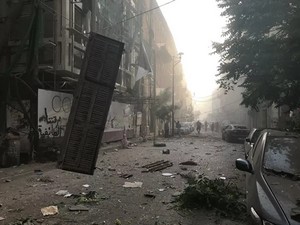 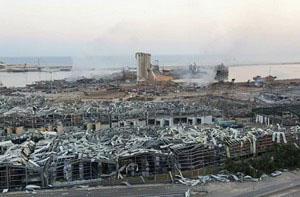
Tragedy struck in Beirut. It is already clear that the explosion of ammonium nitrate in a warehouse in the port killed more than 100 people and injured more than 4,000 people. The investigation of the tragic incident continues, and the reasons will certainly be revealed. But it is already known that ammonium nitrate with a total mass of 2750 tons was stored in the warehouse for a long time. It is likely that the personnel responsible for storing this substance did not have sufficient knowledge of the particular hazards involved. In accordance with the Model Regulations of the UN Recommendations on the Transport of Dangerous Goods (hereinafter referred to as the Model Regulations), ammonium nitrate (ammonia nitrate, nitrate of ammonium), UN number 1942, belongs to hazard division 5.1 - oxidizing substances. This is how the properties of ammonium nitrate are described in column 17 of the International Maritime Dangerous Goods Code (IMDG Code), based on the Model Regulations: “Crystals, granules or small prills. Soluble in water. Accelerates the burning of combustible material. A large-scale fire on board a ship carrying this substance could create an explosion hazard if contaminated (e.g. by liquid fuel) or in a substantially confined space. Close detonation may also involve a risk of explosion. Decomposes on strong heating, giving off toxic and combustion gases. Transportation of ammonium nitrate capable of self-heating sufficient to initiate decomposition is prohibited”. In accordance with Chapter 1.4 of the Model Regulations, this substance belongs to High Consequence Dangerous Goods (HCDG). Note that if chapter 1.3 of the Model Regulations "Training of employees" obliges all persons involved in the transport and handling of dangerous goods to undergo training followed by retraining, then chapter 1.4 "Provisions relating to safety"obliges persons carrying out the transport and handling of HCDG receive additional training in the field of safety. History, unfortunately, knows many cases when ammonium nitrate demonstrated its hazardous properties in the illiterate handling of this cargo. The consequences of some incidents involving ammonium nitrate are comparable to those of full-scale military operations involving heavy weapons. Dear visitors of our site can find on the Internet a detailed description of the tragedy that broke out on April 16, 1947 in the port of Texas City, Texas, USA, when due to the irresponsibility and incompetence of all persons involved in the operations of receiving ammonium nitrate on board the Grandcamp steamer, more than 1,500 people including its captain were killed and colossal damage to transport infrastructure and the city was caused. And here again a new large-scale tragedy occurred. What conclusions, in our opinion, should be drawn from the Lebanese catastrophe? First,it is necessary to radically and very quickly revise the national legislative and regulatory framework related to the transport of dangerous goods and their storage. Second,it is necessary to ensure regular and effective professional development and retraining of officials of state bodies who carry out managerial and control and supervisory functions in the field of transportation and handling of dangerous goods. The practice of IDGCA and the International Staff Training Center shows that trained and certified officials working, for example, in seaports, have a much greater responsibility and understanding in the organization of all types of work with dangerous goods and do not allow violations, deviations from requirements of governing documents and local work flow charts and instructions. Third,it is necessary to organize regular and effective professional development of the management, engineering-and-technical personnel and other employees of enterprises that transport and handle dangerous goods. If the training of the management and engineering staff is carried out to some extent, then the training of employees and workers of companies operating in seaports is left to chance. These companies solve this problem in different ways, both by sending personnel for training, and by short instructions only. IDGCA expresses its sincere condolences to the Lebanese people in connection with the August 4 tragedy. | |
Competence and competent organizations in the transport of dangerous goods | 31.08.2020 |
|
Transportation and handling of dangerous goods (DG), including high-risk goods, is regulated by many international and national documents, and activities related to DG are controlled by dozens of supervisory and administrative authorities. Despite this, very often non-standard situations arise when the direct application of an international or national regulatory document is impossible, and the decision on the possibility of transporting goods is made based on the experience, knowledge, competence and responsibility of the person or the organization that makes such a decision. It is impossible to develop a unified algorithm for making a decision in a difficult situation, because the level of knowledge and experience of managers and personnel of enterprises is different, and the situations are not the same. Complicated and non-standard situations with DG can arise on any type of transport. They are connected both with the preparation of documents and with the real state of goods and vehicles. Such situations are encountered when importing DG into the territory of the Russian Federation, when exporting them in the opposite direction and, of course, when transporting goods across the vast territory of Russia. It is in these cases that the decisions of the competent authorities, competent organizations and competent experts, who will be able to analyze the situation as quickly as possible and work out the solution required by the situation are required. IDGCA, having a consultative status in the UN ECOSOC Committee of Experts on the Transport of Dangerous Goods and the Globally Harmonized System of Hazard Classification and Labeling of Chemical Products, has repeatedly participated in resolving difficult situations and has always provided competent advice to both DG carriers and supervisory authorities. This is well known to everyone involved in the transport and handling of DG. Experience and knowledge accumulated over tens of years, professional training and retraining of experts help IDGCA to get involved in solving complex issues in various geographic points of Russia. However, the experts of the IDGCA have to resolve issues not only in the field of safety, but also in overcoming bureaucratic "squiggles", or, frankly, the consequences of corruption actions of some officials and employees of organizations under their control. Unfortunately, the practice of recent years shows that the administrative bodies and the organizations under their control conclude public and private agreements, according to which some commercial structures become monopolists in the provision of services in DG transportation. But the problem is not even that someone wants to give someone the opportunity to earn big money, but that conditions are deliberately created under which normal and safe transportation of DG becomes problematic. There are many examples of such "squiggles" for business, but they have become large-scale since November 2016. Perhaps, at a certain level, someone decided that the sphere of DG transport is very profitable, and by monopolizing it, one can “spin up” a good business. Perhaps, representatives of a new generation appeared those, who are poorly versed in issues of safety, technical and technology field, but well understand how to make money from business problems. It is very good that the Government of the Russian Federation and the State Duma of the Federal Assembly of the Russian Federation have decided to conduct a regulatory guillotine, and this concept has become very popular. However, there is no real action, at least in the field of IDGCA transportation. Orders, rules and departmental agreements, which are in no way consistent with international and national laws, have not yet been canceled. Understanding this situation and looking for ways to overcome negative situations in the field of DG transport, IDGCA applied to the Government of the Russian Federation with a proposal to create a unified regulatory framework in the field of transportation of DG in Russia. Perhaps, the experience, knowledge and professionalism of IDGCA and its partners will be in demand by the Government in these difficult times for Russian business. | |
| Happy Great Victory Day! | 07.05.2020 |
|
On behalf of the leadership of the International Dangerous Goods and Containers Association and its subsidiaries, we congratulate you and your families on the Great Victory Day! 75 years have passed since the end of World War II, but the memory of the heroic past is passed down from generation to generation. That is what allows us to maintain the truth about the war, about the great deeds of our fathers, mothers and grandfathers. These days, accept our sincere wishes to preserve your health, the health of your loved ones, your work, your business, faith in the truth and a better future. Happy Victory Day, dear friends! Ognev M.I. | |
IDGCA helps business in a pandemic | 30.04.2020 |

The spread of coronavirus infection in almost all regions of Russia has created difficult conditions for the transport business and cargo owners. This fully applies to the sphere of dangerous goods traffic. To prepare dangerous goods for transportation `in multimodal communication, all participants in the transport process require knowledge of the rules and features of their transportation on each type of transport, including knowledge of relevant international regulations. Incorrect execution of transport documents and poor preparation of cargo for transportation can lead to significant material losses due to downtime of vehicles and transport equipment and to create a threat to the safety of transportation. Experts from the International Dangerous Goods and Containers Association (“IDGCA” NP), the International Staff Training Center (ISTC) and ZAO “Russian Register” provide shippers and transport workers with ongoing consultations and help them with paperwork necessary for the transport of dangerous goods of various hazard classes. ISTC conducts distance training of specialists, and ZAO “Russian Register” based on the results of inspection of cargo, transport equipment and vehicles develops multimodal declarations and draws up certificates of conformity in the System of Voluntary Integrated Certification of Safety and Quality Systems (SQS). Thus, all our companies have timely prepared for remote work and provide quality services in difficult conditions. In recent days, IDGCA paid special attention to the transportation of oxygen, which is vital for the treatment of victims of coronavirus infection. In this text, we provide recommendations for the safe transport of oxygen, which should not be forgotten even in conditions of force majeure. | |
ISTC conducts remote training | 27.03.2020 |

The International Staff Training Center (ISTC) continues to accept applications for training under additional professional continuing education programs. Taking into account the current situation in the country and the world caused by the spread of coronavirus, training is carried out remotely. We will do our best to ensure that the quality of training at ISTC meets the goals of continuing education for employees of enterprises.At lectures using presentations and video materials, course participants will have the opportunity to have a direct dialogue with the teacher, they will be provided with all the information necessary for the successful learning. Waiting for your application for training! | |



